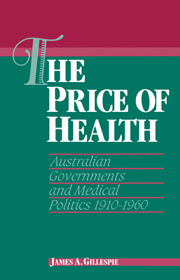Book contents
- Frontmatter
- Contents
- List of Tables
- Preface
- Acknowledgements
- Abbreviations
- Part I Medicine and the State: 1900 to 1939
- Chapter 1 ‘A Game of Animal Grab’: Medical Practice, 1920–1939
- Chapter 2 National Hygiene and Nationalization: the Failure of a Federal Health Policy, 1918–1939
- Chapter 3 Doctors, the States and Interwar Medical Politics
- Chapter 4 The Defeat of National Health Insurance
- Part II The Reconstruction of Medicine? Planning and Politics, 1940 to 1949
- Part III The Public and the Private
- Notes
- Bibliography
- Index
Chapter 4 - The Defeat of National Health Insurance
Published online by Cambridge University Press: 22 September 2009
- Frontmatter
- Contents
- List of Tables
- Preface
- Acknowledgements
- Abbreviations
- Part I Medicine and the State: 1900 to 1939
- Chapter 1 ‘A Game of Animal Grab’: Medical Practice, 1920–1939
- Chapter 2 National Hygiene and Nationalization: the Failure of a Federal Health Policy, 1918–1939
- Chapter 3 Doctors, the States and Interwar Medical Politics
- Chapter 4 The Defeat of National Health Insurance
- Part II The Reconstruction of Medicine? Planning and Politics, 1940 to 1949
- Part III The Public and the Private
- Notes
- Bibliography
- Index
Summary
In 1919, Dr J. Corbin, an Adelaide lodge doctor, published a vehement attack on the effects of private medicine on Australian health care. He contrasted the manner in which:
the lodge patient consults his medical attendant before he is gravely ill. The private patient either consults no-one or takes some quack medicine or a prescription from a chemist and it is not until he is seriously ill that he seeks medical advice.
This does not apply to the really well-to-do, but to the intermediate class, to whom economy is essential, and this class forms the largest part of any community, and is the class which is most likely to be benefited by a scheme of national insurance. The very poor and destitute are well provided for; the very rich can pay for any skill or advice; it is the intermediate class that is always sure to suffer.
Support for national insurance spanned the conservative parties, academic economists and participants in the forums of the Australian Institute of Political Science as well as sections of the labour movement. Contributory insurance schemes were at the heart of a programme to bolster social solidarity as well as individual financial security. Faced with the threat of class conflict, yet hostile to the social inequities of uncontrolled capitalism, liberals embraced schemes which appealed to a higher notion of community.
- Type
- Chapter
- Information
- The Price of HealthAustralian Governments and Medical Politics 1910–1960, pp. 87 - 112Publisher: Cambridge University PressPrint publication year: 1991
- 1
- Cited by



